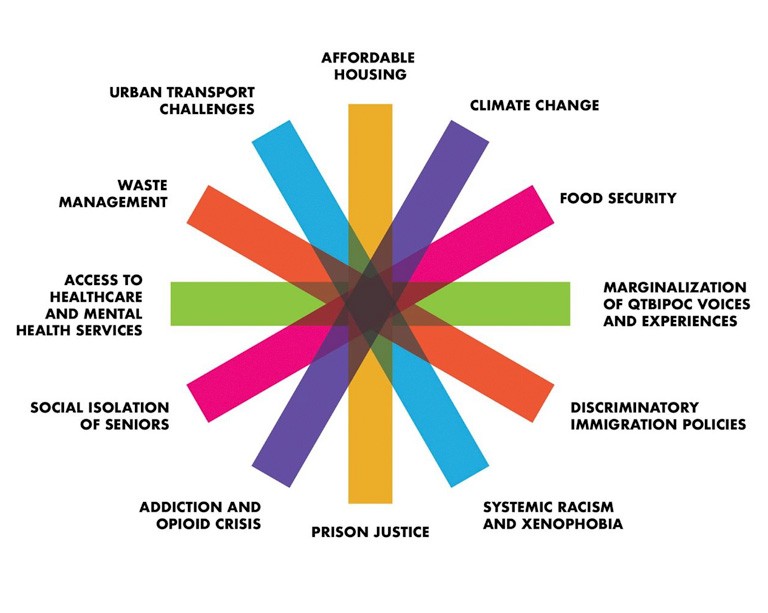Concordia’s SHIFT funds 7 projects with significant community impact
 Photo by qinghill on Unsplash
Photo by qinghill on Unsplash
A $10-million donation from the Mirella & Lino Saputo Foundation and the Amelia & Lino Saputo Jr. Foundation last fall led to the creation of Concordia’s forward-thinking SHIFT Centre for Social Transformation. Since then, the centre has awarded $40,000 to its first cohort of social transformation projects.
Seven multi-stakeholder teams, which include Concordians and members of the broader Montreal community, will receive support from this first round of funding.
“I’m excited that we will get to continue learning alongside these diverse community and university leaders,” says Susan Edey, interim program manager at SHIFT.
Each one of the SHIFT-supported projects presents innovative approaches to transforming systems connected to justice, equity and sustainability.
Social justice
SHIFT is supporting a local division of the Walls to Bridges Program, a national education initiative that brings incarcerated and non-incarcerated students together to participate in experiential and dialogical learning. Formerly incarcerated leaders of the program will lead training sessions in cooperation with Concordia faculty members and graduate students.
The training will provide Montreal-based organizers with first-hand insights and concrete lessons about the benefits, challenges and best practices of setting up this type of program in order to inform their next steps
SHIFT also granted funding to Concordia’s Decolonial Perspectives and Practices (DPP) Hub to continue providing collaborative learning events on campus. The interdisciplinary, student-led initiative began in 2019 as an effort to address racist, heteronormative and colonial biases in higher education and celebrate “learning from queer, trans, Black, Indigenous and people of colour experiences and voices.”
Members of the group describe the DPP Hub as “a network made up of students, faculty, staff and community members. It connects people who are dedicated to overcoming an institutional praxis that oppresses, excludes and marginalizes.”
Working with several other like-minded initiatives on campus, the DPP Hub plans to host up to 10 events in the upcoming academic year, which will continue to provide platforms for minority voices to engage in candid discussions about what decolonized education looks like and could look like at Concordia.
SHIFT funding will also support the Montreal-based non-profit organization LI-BER-T House, which develops housing for women in a transitional period following addiction treatment or incarceration
“While many such facilities exist for men, these services are not readily available to women,” says Liane Berry, founder of the organization. Berry herself went through a decades-long struggle with addiction and made a difficult transition out of the criminal justice system.
“The LI-BER-T House project is based on my personal experience with the insufficient services available to women. They have failed to provide long-term solutions to recovering women,” she says.
Berry hopes to help increase the chances of success for marginalized women as they develop healthy and safe lifestyles.
The organization will work with Concordia’s Felice Yuen, associate professor of applied human sciences in the Faculty of Arts and Science, and graduate student Beatriz Hoffmann-Kuhnt.
“It’s really awesome that Concordia is supporting us — not only financially, but also with mentoring and student internships,” Berry says.

Health and mental well-being
SHIFT will also fund the Creative Arts Therapy Training Clinic, which will serve as a training or practicum site for Concordia graduate students. The clinic will provide therapy services under the supervision of faculty and other mental health professionals.
The services will first be made available to the Concordia community and eventually to people of underserved demographics in the broader Montreal community.
The group will work in partnership with Campus Wellness and Support Services (CWSS). Members of the clinic hope to contribute to a more robust and accessible mental health centre, in particular by helping coordinate the efforts of various health services and departments.
“The SHIFT grant we received is to help build this relationship with CWSS from the ground up,” says Heather McLaughlin, lecturer in the Department of Creative Arts Therapies. She puts the emphasis on fruitful collaborations with her colleagues.
“Creative arts therapies bring innovative and novel treatments that really promote thriving and resilience. Collaborating to build this sort of mental health service has been a long-standing dream of mine.”
Healing Through Generations, another funded project, will expand and promote an online database of racialized mental health professionals. The database is intended to support students and community members who come from racialized communities and are looking for mental health services and support that are adapted to their needs and situation.
The project will be a collaborative effort between the Community University Research Exchange, Racines Bookstore and the Concordia chapter of Stronger than Stigma.
SHIFT’s funding for A Toolkit for Optimizing Intervention will support a team from the Amal Centre for Women in their development of a toolkit that will make direct, culturally sensitive services more accessible to the people who need them.
For nearly 20 years, the Amal Center has provided mental health and social services to immigrant women and families who have suffered from domestic abuse and conjugal violence.
For this project, the Amal Centre team will work in collaboration with Concordia's Rosemary Reilly, professor of applied human sciences, to document their work and share their best practices with other key players in their network.
Environment and ecology
In addition to the initiatives connected to social justice and mental health and wellness, SHIFT is supporting an important waste reduction initiative that took root at Concordia.
Since 2016, Concordia’s Waste Not Want Not campaign has been hugely successful in influencing the university’s waste culture. Through presentations, visual campaigns and a waste ambassadors program, the group has helped educate the Concordia community about composting, sorting and disposal.
SHIFT funding will help the Waste Not Want Not team explore possibilities for expanding their model to other institutions across the city.
“We want to bring our experience at Concordia to other schools and organizations in Montreal,” says group member Ribal Abi Raad.
“Half of our trash is actually compostable, and this number can easily be augmented if we switch to using more organic material. If we can educate people about these things, we can come close to zero waste.”
The group intends to use both data and personal outreach to ensure that people reduce their waste as much as possible.
Looking forward
In what remains of its pilot year, SHIFT will provide $70,000 of additional funding to projects that promote the centre’s mandate. Details on the next round of funding are on hold due to the evolving COVID-19 situation.
Find out more about Concordia’s SHIFT Centre for Social Transformation.
Follow SHIFT on Facebook or sign up for its newsletter to stay informed about next steps.


